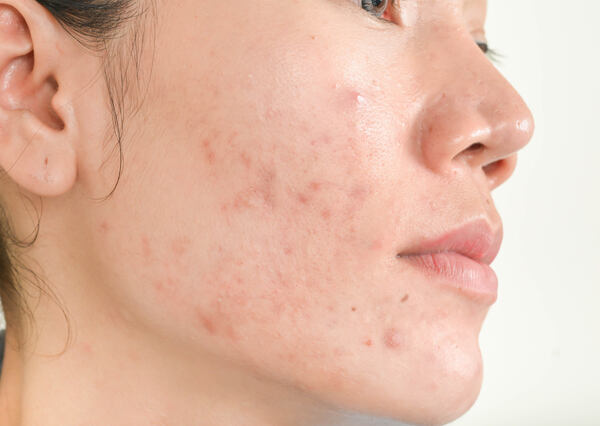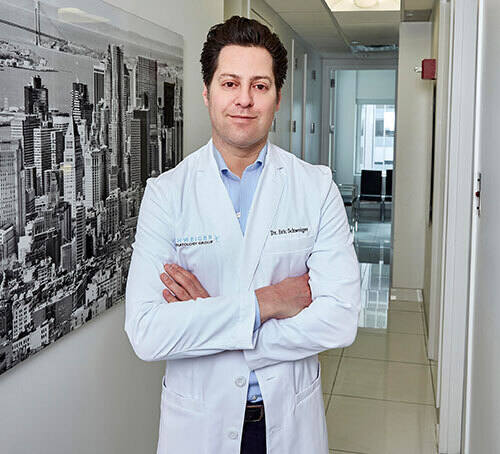What Causes Acne Scars & How to Prevent Acne Scars

If you’ve ever had to deal with acne scars – or if you’re currently dealing with them – you probably have lots of questions. Some common questions related to acne scarring include: What causes acne scars? What makes someone more likely to scar? Is there anything I can do to prevent scars?
Luckily, we do have some information on what causes acne scars, what increases your risk of scarring, and what’s the best way to keep those nasty scars far away from your beautiful face. (Hint: don’t touch it!)
What causes acne scars?
When acne forms on your skin, your body’s natural healing processes kick in just like they would for an injury or illness. The problem is that’s not always a perfect system. Acne forms when your skin pores get clogged with too much oil and dead skin cells. Sometimes, it appears close to the surface of the skin – which means it will probably heal after a short time with minimal scarring. When acne is rooted farther down in the skin, though, it takes longer to heal. Because this runs deeper and destroys more of your skin tissue, it often leaves scars.
After a breakout, your body will try to heal itself by replacing the lost skin tissue that has been destroyed. Scarring occurs when the body produces either too much or too little of this tissue. When the body creates too much tissue, the acne lesion becomes a raised scar – known as a hypertrophic scar (or, in severe cases, a keloid). On the other hand, a lack of tissue results in skin depressions – known as atrophic scars.
Those dark marks you sometimes get after a bad outbreak are a different type of scar. Technically, they’re not scars at all, just changes in pigmentation (a technical term for skin color). When a lesion gets popped or opened up some other way, the skin has to close back together and cover up the depression. Your body is usually pretty good at healing itself, but after a particularly deep trauma – like a pit from a popped acne lesion – the body doesn’t always cover up seamlessly. Often, the skin that closes over the wound changes color, texture, or tone. In other cases, the broken blood vessels from a popped lesion leave a mark on your skin. These are what we usually call “dark marks” or hyperpigmentation.
Even if you don’t pop your acne, you may still see dark red or brown marks appear on your skin from especially deep or inflamed cases. Don’t panic, though: if you held back from popping that pimple, these marks will usually fade within a few months.
What are the best acne treatments?
Sorting through the numerous acne treatments available can be frustrating and overwhelming. Our team of licensed skin care professionals have been helping patients treat both active acne outbreaks and the scarring that can result from lesions. Learn more about the variety of treatments available.
What can you do to prevent acne scars?
Popping your pimples is the surest ways to develop a scar. In fact, when it comes to pimples, “hands off” is definitely the best policy. Touching, poking, or picking at a lesion adds more oil to the skin and causes deeper trauma – both of which increase your risk of scarring.
Of course, that’s easier said than done. And trust us, we know how hard it can be to resist popping a zit. Even though you know it’s bad for your skin in the long run, sometimes you just want to get rid of that thing right away. Before you reach up and quickly zap that blackhead, remember that, while it may solve a short-term problem, it’s only going to cause you grief later on. So do whatever you have to to keep yourself from putting that pimple out of its misery.
Why do I scar from acne?
Sadly, even when you practice the hands-off policy, you can still sometimes get scars. Here are some factors that play a role in whether or not you’ll develop lasting marks after a bad breakout:
- Factor 1: Genetics: For some people, scarring is simply in the genes. If your family has a history of acne scars, you may want to be extra careful about taking care of your skin.
- Factor 2: Sun exposure: The Vitamin D in sunlight is great for your face – just don’t get too much of it. While intense sun exposure may not directly cause scarring, it definitely plays a role in making your acne marks darker and more noticeable.
- Factor 3: Puberty: Big surprise, right? Someday we’ll discover puberty is actually good for something. In the meantime, it seems to cause more trouble than it’s worth. Case in point: teenagers tend to develop more acne because of all the hormonal changes taking place in their bodies. And more acne means a higher risk of scarring.
- Factor 4: Acne severity: As you might expect, scarring is directly tied to severity. When acne is more inflamed, more widespread, and more deeply rooted in the skin, scarring is much more likely to occur.
- Factor 5: Acne frequency: Similarly, patients who experience frequent breakouts run a higher risk of scarring.
- Factor 6: Gender: Both men and women can develop acne scarring – it just seems to be more prominent among men. That’s because, in general, men tend to develop acne that’s severer and more persistent – due to androgen (the male hormone). Sorry, guys.
- Factor 7: Time: The sooner, the better! Turns out the longer you wait before getting treatment, the higher your risk of developing scars. So if just washing your face and keeping your hands off isn’t doing the trick, it may be time to see a dermatologist and get some help.
